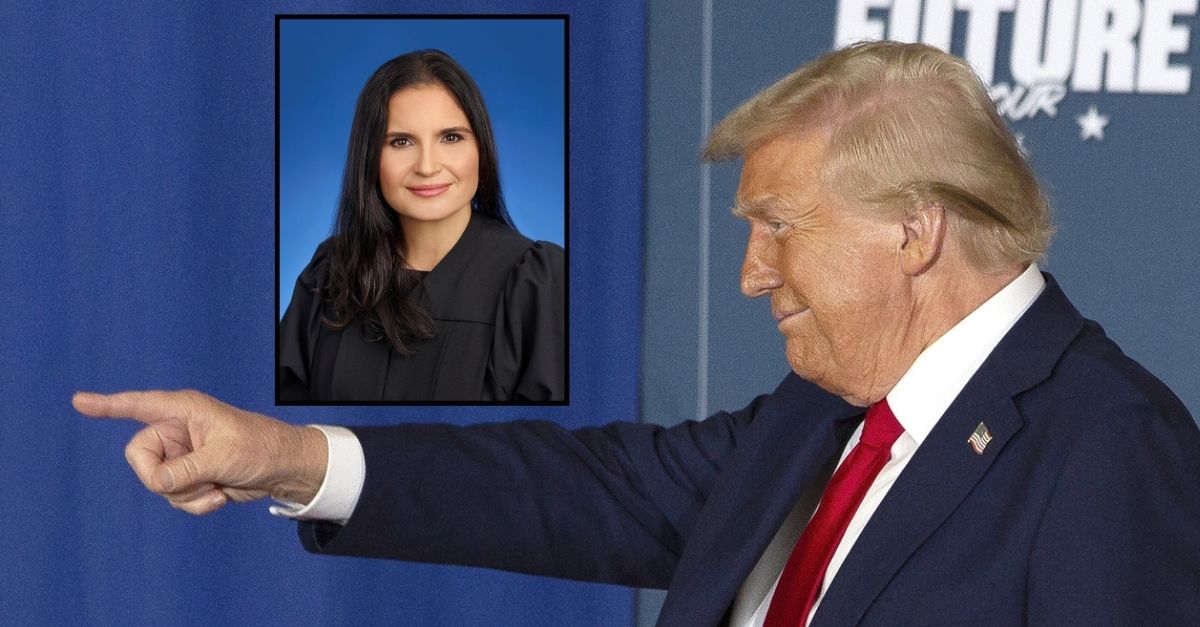
Inset: Judge Aileen Cannon (U.S. District Court for the Southern District of Florida). Background: Republican Candidate for President Donald Trump attends the Building America’s Future, Southeastern Pennsylvania Roundtable at the Drexelbrook Event Center on October 29, 2024 in Drexel Hill, Pennsylvania. (Matt Bishop/imageSPACE/Sipa USA).
U.S. District Judge Aileen Cannon — who controversially dismissed the federal criminal case against Donald Trump for his alleged mishandling of classified documents — has acknowledged that she cannot block the Department of Justice from publicly releasing the first volume of special counsel Jack Smith’s final report detailing his investigation into the president-elect over allegations of election interference that culminated in the Jan. 6 attack on the Capitol.
In a five-page ruling issued Monday, Cannon conceded that she did not have the authority to block the release of the election interference portion of the report because it did not implicate the due process rights of Trump’s co-defendants in the classified documents case, Walt Nauta and Carlos De Oliveira.
However, Cannon remained steadfast in temporarily preventing the second volume of Smith’s report — which deals with findings in the classified documents case she is presiding over — from being released to select members of Congress.
The DOJ over the weekend twice filed court documents confirming that the first volume of the special counsel’s report would have no impact on the cases before Cannon, claiming that nothing in that part of the report “directly or indirectly refers, relies, or bears in any respect upon any evidence or argument relevant to any of the charges alleged against Defendants Nauta and De Oliveira in this case.”
The Justice Department noted that the first volume makes two references to the classified documents case — neither of which mention Nauta or De Oliveira, their alleged conduct, or the charges against them — which would be provided in a sealed filing.
“Based on these representations, the Court sees an insufficient basis to grant emergency injunctive relief as to Volume I,” Cannon wrote. “The Court’s Order Granting Defendants’ Motion to Dismiss Superseding Indictment Based on Appointments Clause Violation is ‘confined to this proceeding’ and hence this Court’s authority to enforce its own orders is similarly confined to this proceeding and to the remaining defendants in this proceeding.”
Cannon had dismissed the classified documents case against Trump, Nauta and De Oliveira, reasoning that Smith’s appointment as special counsel was unlawful. While Smith’s office dropped the cases against Trump due to long-standing policy against prosecuting a sitting president, the DOJ has appealed Cannon’s dismissal regarding the cases against his co-defendants. That case is currently under review before the U.S. Court of Appeals for the Eleventh Circuit.
The same appeals court last week similarly denied petitions from Nauta and De Oliveira seeking to halt the release of the entire special counsel’s report.
Despite the classified documents case being on appeal before the Eleventh Circuit, Cannon on Monday ordered the parties to appear in her Florida courtroom on Friday for a hearing on the issue of releasing the second volume of Smith’s report to congressional leadership. While Nauta and De Oliveira have argued that release of the report would impugn their right to a fair trial, the DOJ said it should be allowed limited disclosure, citing to “public interest in keeping congressional leadership apprised of a significant matter within the Department while safeguarding defendants’ interests.”
“All parties agree that Volume II expressly and directly concerns this criminal proceeding,” she wrote. “All parties also appear to agree that public release of Volume II would be inconsistent with the fair trial rights of Defendants Nauta and De Oliveira and with Department of Justice Policy governing the release of information during the pendency of criminal proceedings.”
Cannon appeared to indicate that at this stage in the proceedings, she agrees with Nauta and De Oliveira’s take on the matter, writing:
“Release of Volume II, even on a limited basis as promised by the United States, risks irreversibly and substantially impairing the legal rights of Defendants in this criminal proceeding. The Court is not willing to make that gamble on the basis of generalized interest by members of Congress, at least not without full briefing and a hearing on the subject. Nor has the United States presented any justification to support the suggestion that Volume II must be released to Congress now, as opposed to after a reasonable period for an expedited hearing and judicial deliberation on the subject. For these reasons, the Court must temporarily enjoin Attorney General Garland, the Department of Justice, its officers, agents, officials, and employees, and all persons acting in active concert or participation with such individuals, from (a) releasing, sharing, or transmitting Volume II of the Final Report or any drafts of Volume II outside the Department of Justice, or (b) otherwise releasing, distributing, conveying, or sharing with anyone outside the Department of Justice any information or conclusions in Volume II or in drafts thereof.”
In closing, Cannon also defended her belief that the court retains jurisdiction over the case, noting that when the Eleventh Circuit denied Nauta and De Oliveira’s request to stop the release of Smith’s report, the order “contained no directive to this Court restricting its authority to adjudicate the properly filed Emergency Motion in this Court.” The DOJ had previously asserted that she lacked any jurisdiction over the case while it was before the appellate court.
“Nor is the Court persuaded by the United States that it is divested of jurisdiction to consider the Emergency Motion, which concerns the release of information that directly implicates the fair trial rights of Defendants Nauta and De Oliveira and clearly activates this Court’s obligation to preserve the integrity of this proceeding should the Eleventh Circuit find error in the Court’s Order Dismissing Superseding Indictment Based on Appointments Clause Violation,” she wrote.
As previously reported by Law&Crime, Cannon’s temporary restriction on the release of the election interference volume of the report expires at midnight.







